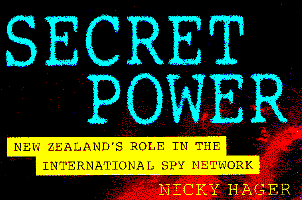
Press Release
Few New Zealanders have heard of the Government Communications Security Bureau (GCSB). Even fewer know what the GCSB does. In fact, the GCSB is New Zealand's largest and most secret intelligence agency, using state-of-the-art electronics to spy on countries throughout the Pacific, including friends, neighbours and trading partners.
In this startling new book, the shadowy world of the GCSB is broken open for the first time. Secret Power exposes, in remarkable detail, the secret workings of this organisation and the global network of which it is part, and reveals how the demands of this international intelligence network are put ahead of New Zealand's own political and economic interests. Geared to serve an alliance with the United States, New Zealand's spies, for example, failed to warn of the Rainbow Warrior bombing, and proved useless during the Fiji coup. Secret Power provides compelling arguments for strengthening New Zealand's independence by leaving that alliance.
Nicky Hager was born in Levin, New Zealand and gained degrees in physics and philosophy. He has for 20 years been a campaigner and researcher on nuclear, military and environmental issues.
Press Clipping Nelson Mail, 14 August 1996
Wellington - New Zealand's spying agencies are more of a risk to the country's well-being than any threat they were designed to spy on, says a public policy expert.
Victoria University public policy analyst Cath Wallace said today that spying on Asian countries with which New Zealand wanted to foster trade was "economic suicide".
A new book called Secret Power, published yesterday, alleged the Government Communications Security Bureau (GCSB) was involved in a secret Western spy network called Echelon, and was effectively under the orders of the United States and Britain.
Written by peace activist Nicky Hager, the book said the GCSB actively spied on neighbours in the Pacific as well as Japan, Southeast Asia, China and Russia - "any country in fact that the foreign allies (linked through an alliance called Ukusa) ask it to spy on".
Hager said in the book that a main role of GCSB's Waihopai station near Blenheim was intercepting phone, fax, telex and electronic mail messages to and from the Pacific.
Former prime minister David Lange said in the book's foreword that as prime minister, and minister in charge of security and intelligence services, he was never told the country was part of an international electronic spy network.
"It is an outrage that I and other ministers were told so little, and this raises the question of to whom those concerned saw themselves ultimately answerable," Mr Lange said.
Ms Wallace, of Victoria University's public policy group, said today New Zealanders should welcome the book's revelations.
"There are major unresolved issues in the accountability of New Zealand's secret agencies," she said.
"The GCSB is an outlaw in a literal sense. It is not established by law. Unlike the SIS, which at least has a statute, the GCSB has no legal limit on its functions.
"The great irony of all this is that the Intelligence and Securities Agencies Act railroaded through (Parliament) earlier this year was justified on the basis that there might be unknown parties who wanted to put our international relations and economic well-being at risk."
It was now plain that those very agencies for which "we were to sacrifice our open society" were far more of a risk to New Zealand's relations than anything else.
"The spying is probably of considerable potential detriment to New Zealand because it will alienate countries upon which we are busy staking our economic future, such as Japan, and to those who otherwise had thought they could trust us, such as the South Pacific states," Ms Wallace said.
At the hearing on the Intelligence and Security Agencies Bill this year, Prime Minister Jim Bolger scoffed at those with concerns and said New Zealanders should trust him and other ministers in charge of covert agencies, she said.
"Either Mr Bolger knew about all this and must take the rap for taking such risks with our international relations and economy, or he didn't and the critics are right that the covert agencies are out of control."
In 1991, Mr Bolger told Parliament the GCSB "does not monitor New Zealand's communications, nor those of New Zealand's friends in the South Pacific".
Questions to Mr Bolger yesterday about the extent of his knowledge of the GCSB's operations were met with the response that he did not comment on intelligence matters.
NZPA
Craig Potton Publishing is an independent publishing company based in Nelson, New
Zealand. We publish illustrated books of fine quality on a range of subjects by New Zealand
authors and photographers, with a particular interest in New Zealand's wild places and
natural history, and its art and culture.